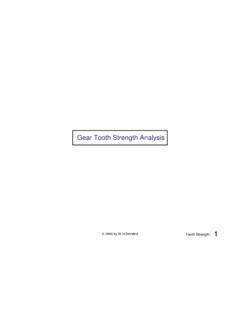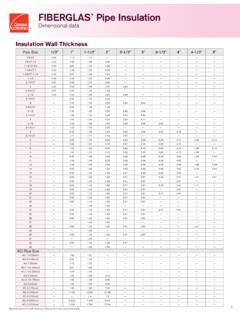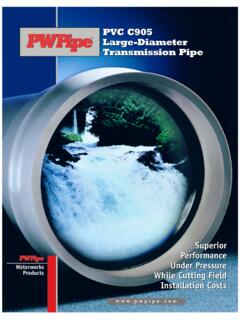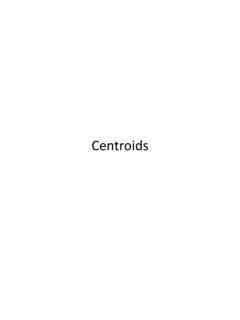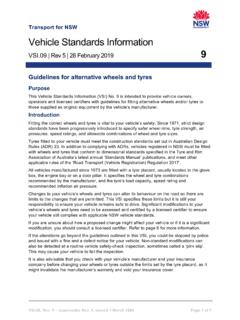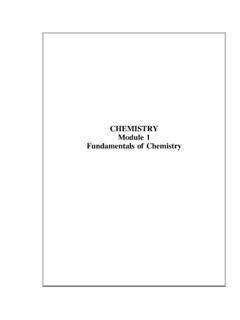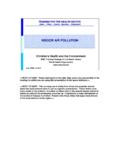Transcription of Basic Stress Equations - Fairfield University
1 Dr. D. B. WallaceBasic Stress EquationsInternal Reactions:6 Maximum(3 Force Components & 3 Moment Components)Normal Force) () (Shear ForceszxyPVyVxTorsional Moment) () (Bending MomentszxyTMyMxor TorqueForce ComponentsMoment Components"Cut Surface""Cut Surface"Centroid ofCross SectionCentroid ofCross SectionNormal Force:Axial ForcezxyPCentroid Axial Stress "Cut Surface" =PAl Uniform over the entire cross Axial force must go through Forces:Cross SectionyAaPoint of interestLINE perpendicular to V through point of interest= Length of LINE on the cross section= Area on one side of the LINE Centroid of entire cross sectionCentroid of area on one side of the LINE= distance between the two centroids= Area moment of inertia of entire cross sectionabout an axis pependicular to V.
2 VbAayI"y" Shear ForcezxyVy"x" Shear ForcezxyVx = VAyIbabgNote: The maximum shear Stress for common cross sections are:Cross Section:Cross Section:Rectangular: max= 32 VASolid Circular: max= 43 VAI-Beam or H-Beam:webflange max=VAwebThin-walledtube: max= 2 VABasic Stress EquationsDr. D. B. WallaceTorque or Torsional Moment:Solid Circular or Tubular Cross Section:r = Distance from shaft axis to point of interestR = Shaft RadiusD = Shaft DiameterJDRJDD forsolidcircularshaftsforhollowshaftsoi= = = 444432232ejTorquezxyT"Cut Surface" = TrJ maxmax= = 1616344 TDTDDD forsolidcircularshaftsforhollowshaftsooi ejRectangular Cross Section:TorquezxyTCentroid Torsional Stress "Cut Surface" 12abNote:a > bCross Section:Method 1: + 122318 TababbgejONLY applies to the center of the longest sideMethod 2: 12122,,= Taba/b 1.
3 333----Use the appropriate from the table on the right to get the shear Stress at either position 1 or Cross Sections:Treated in advanced Stress EquationsDr. D. B. WallaceBending Moment"x" Bending MomentzxyzxyMx My"y" Bending Moment = = MyIandMxIxxyywhere:Mx and My are moments about indicated axesy and x are perpendicular from indicated axesIx and Iy are moments of inertia about indicated axesMoments of Inertia:hcbDcRIbhhZIcbhisperpendicularto axis= == 32126 IDRZIcDR= = == = 4433644324 Parallel Axis Theorem:I = Moment of inertia about new axisIIAd=+ 2centroiddnew axisArea, AI = Moment of inertia about the centroidal axisA = Area of the regiond = perpendicular distance between the two Bending Stress Equations .
4 Max= 323 MDSolidCircularbg max= 62 MbhRectangularaf max= =McIMZThe section modulus, Z, can be found in many tables of properties of common cross sections ( , I-beams,channels, angle iron, etc.).Bending Stress Equation Based on Known Radius of Curvature of Bend, .The beam is assumed to be initially straight. The applied moment, M, causes the beam to assume a radius ofcurvature, .Before:After:MM = EyE = Modulus of elasticity of the beam materialy = Perpendicular distance from the centroidal axis to thepoint of interest (same y as with bending of astraight beam with Mx). = radius of curvature to centroid of cross section3 Basic Stress EquationsDr.
5 D. B. WallaceBending Moment in Curved Beam:Geometry:rrerrn oicentroidcentroidalneutral axisaxisoiynonlinearstressdistributionMc cio rAdAerrnarean== z A = cross sectional arearn = radius to neutral axisr = radius to centroidal axise = eccentricityStresses:Any Position:Inside (maximum magnitude):Outside: = +MyeArynbg iiiMceAr= oooMceAr= Area Properties for Various Cross Sections:Cross SectionrdAarea zAthrirorRectangle rhi+2trroi FHGIKJ lnht thrirorTrapezoid otirhttttiioio+ + +23bgbgFor triangle:set ti or to to 0ttrtrthrroioiiooi + FHGIKJ lnhttio +2rHollow Circle abr22222 LNMOQP rbra ab22ej4 Basic Stress EquationsDr.
6 D. B. WallaceBending Moment in Curved Beam (Inside/Outside Stresses):Stresses for the inside and outside fibers of a curved beam in pure bending can beapproximated from the straight beam equation as modified by an appropriatecurvature factor as determined from the graph below [i refers to the inside, and orefers to the outside]. The curvature factor magnitude depends on the amount ofcurvature (determined by the ratio r/c) and the cross section shape. r is the radiusof curvature of the beam centroidal axis, and c is the distance from the centroidalaxis to the inside Fiber: iiKMcI= Outside Fiber: ooKMcI= of curvature, r/cKrbcbcbccb/2b/3b/4b/8b/6 BABABABABABABAV alues of K for inside fiber as at iAValues of K for outside fiber as at oBU or TRound or EllipticalTrapezoidalI or hollow rectangularRound, Elliptical or TrapezoidalU or TI or hollow rectangular5
